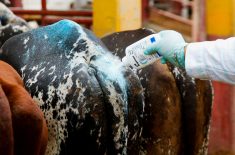Yukon’s government wants the public’s thoughts on plans to upgrade the territory’s Animal Health Act, providing for compensation for losses where required, an appeal process and possibly heavier penalties against infractions.
The territory government has published a discussion document and has set April 30 as its deadline for public comment, but said it also plans “special efforts” such as mailouts and meetings to encourage comments from farmers, outfitters, veterinarians and animal owners.
“An updated Animal Health Act will improve government’s ability to respond to potential future animal health issues in an effective manner,” Brad Cathers, the territory’s minister of energy, mines and resources, said in a release last week.
Read Also

B.C. ostriches culled, CFIA confirms
Ostriches on an embattled Edgewood, B.C. farm have been culled after a prolonged legal battle, the Canadian Food Inspection Agency has confirmed.
Furthermore, Environment Minister Currie Dixon said, an updated act “will recognize the impacts that animal diseases can have on human health, which the current act doesn’t do.”
The government noted its current Act was set up in 1997, before the government set up its Animal Health Program and the position of chief veterinary officer (CVO).
The proposed new law would include the role of the CVO and grant the CVO’s office the authority to act as chief animal health inspector, issue permits, “take action” on reportable or notifiable diseases, and issue orders for quarantines and/or other actions to be taken to reduce or prevent outbreaks.
The new Act would also authorize the territory to offer compensation where animals must be destroyed to limit or prevent a disease outbreak, where Yukon’s animal owners now have to seek compensation through the courts.
“Granting the minister the authority to provide compensation will encourage animal owners to report a disease even if it may result in the destruction of their animal(s),” the government said.
The territory’s current Act also doesn’t provide for an appeal process, which the proposed amendments would cover, laying out the “specific decisions or actions that may be appealed, along with what will be excluded from the appeal process.”
The new Act would also provide a “clearly-defined” time limit in which an animal owner could appeal a decision or action. It would also require an owner to show proof of loss, the government said.
The territory also notes other juridictions can impose prison time of up to one year or penalties exceeding $1,000 per day for an offense involving “deliberate action that would jeopardize the health of either the human, domestic or wildlife population.”
However, the territory said, its Animal Health Act today only allows for “modest” fines of $200 to $500 and an option for up to six months imprisonment.











